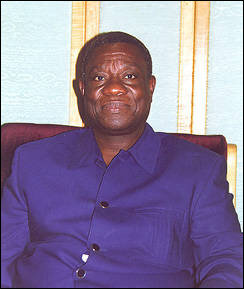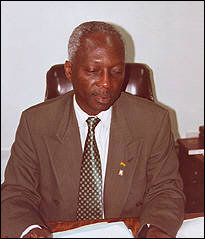 New
Challenges for the Private Sector New
Challenges for the Private Sector
The government is doing everything possible to stimulate and support the private sector, which it recognizesas the engine of growth. Ghana’s Vice President Professor John Atta Mills , emphasized that Ghana is very busy divesting some of the enterprises that have been a drain on the economy and which can best be operated by the private sector.

The Divestiture Implementation Committee (DIC) which comprises government ministers and representatives of the private sector institutions and trades union oversee the privatization. Mr. Emmanuel Agbodo the Executive Secretary of the DIC says, the process evolved since 1988, is to end the economic domination of more than 300 state-owned enterprises. Since then about two hundred of these enterprises have been sold to the private sector or liquidated, and the process is continuing.
The DIC can point to a number of large scale and successful privatization. An example is the Ashanti Goldfields Company. Privatized in 1994, it is now listed on New York, London, Sydney, Toronto and Harare stock exchanges as well as in Ghana. Ten years ago, AGC was producing 220,000 ounces of gold a year from one mine. | Last year, it forecast 1.1 million ounces, rising to 1.4 million ounces by the end of the year. Although Ashanti is presently facing liquidity problems due largely to the falling price of gold on the world market, it still remains one of the largest private mining companies in Africa.

Mr. Kwasi Abeasi, Director General of Private Enterprise Foundation (PEF), an umbrella organization for various trades and industry associations, is satisfied that the government has created the environment to attract foreign capital. The Foundation together with the government has removed all the constraints and all roadblocks inhibiting an aggressive investment drive.
Established to work closely with the government and to promote the investment climate, PEF has been involved jointly with the government in investment promotion missions to the U.S., France, Norway and the Far Eastern countries, where separate trade and investment agreements were signed.
There is private participation also in the agricultural sector, particularly in cocoa production, which is the second largest foreign exchange earner for the country. The most prominent private company is Cashpro who is licensed to purchase cocoa for sale to the government.
Apart from domestic problems, the cocoa industry presently is dogged with ritualistic fall in prices on the world market. Analysts estimate that next year, if there is no fundamental change in prices, Ghana will loose about 100 million dollars in cocoa tax revenue. |

